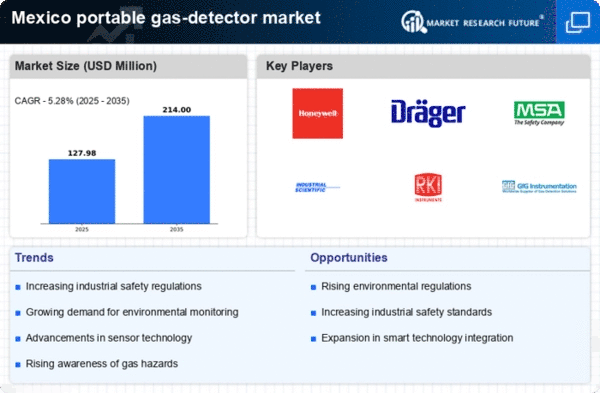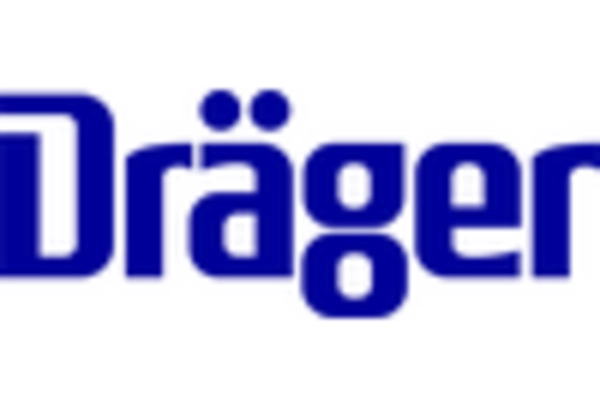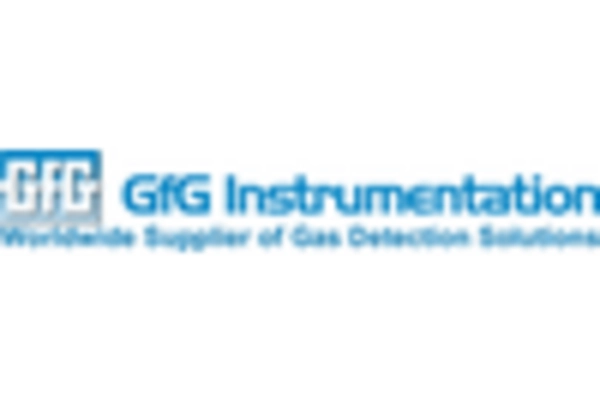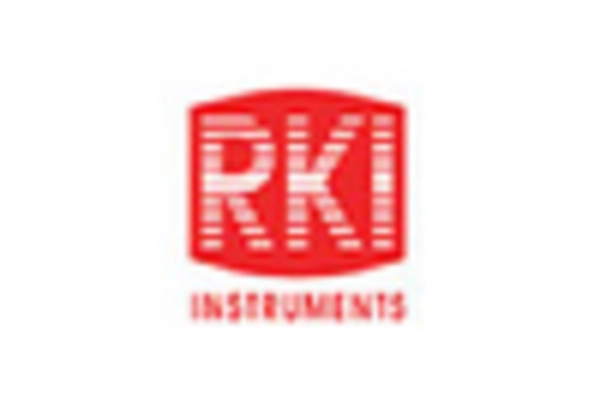Environmental Regulations
Mexico's stringent environmental regulations are driving the portable gas-detector market. The government has implemented various policies aimed at reducing emissions and ensuring environmental safety. These regulations necessitate the use of gas detection equipment in various sectors, including oil and gas, mining, and manufacturing. As companies strive to comply with these regulations, the demand for portable gas detectors is expected to rise. In 2025, it is estimated that compliance-related expenditures in the industrial sector will reach $5 billion, with a significant portion allocated to safety equipment. This regulatory landscape creates a favorable environment for the portable gas-detector market, as businesses seek reliable solutions to monitor and manage gas emissions effectively.
Technological Innovations
Technological innovations are reshaping the portable gas-detector market in Mexico. Advances in sensor technology, wireless communication, and data analytics are enhancing the functionality and reliability of gas detection devices. These innovations allow for real-time monitoring and data collection, which are crucial for effective safety management in various industries. In 2025, the market for advanced portable gas detectors is expected to grow by 20%, driven by the adoption of smart technologies. Companies are increasingly seeking devices that offer improved accuracy and ease of use, which is likely to propel the portable gas-detector market forward. The integration of IoT capabilities into gas detectors is also anticipated to create new opportunities for growth.
Increasing Industrialization
The rapid pace of industrialization in Mexico is a key driver for the portable gas-detector market. As industries expand, the need for safety measures becomes paramount. The manufacturing sector, particularly in automotive and chemical industries, is witnessing significant growth, leading to a heightened demand for portable gas detectors. In 2025, the industrial sector is projected to contribute approximately 30% to the national GDP, which correlates with an increased focus on workplace safety. This trend indicates that companies are investing in portable gas detection technologies to comply with safety regulations and protect their workforce from hazardous gases. The portable gas-detector market is likely to benefit from this industrial growth, as businesses prioritize the health and safety of their employees.
Expansion of the Oil and Gas Sector
The expansion of the oil and gas sector in Mexico is a significant driver for the portable gas-detector market. With the government's push for energy reform and increased investment in exploration and production, the demand for safety equipment is on the rise. The oil and gas industry is inherently hazardous, necessitating the use of portable gas detectors to ensure worker safety and compliance with regulations. In 2025, the sector is projected to account for 25% of the country's total industrial output, further emphasizing the need for effective gas detection solutions. As companies in this sector prioritize safety measures, the portable gas-detector market is likely to experience substantial growth.
Growing Awareness of Occupational Health
There is a growing awareness of occupational health and safety in Mexico, which is significantly impacting the portable gas-detector market. As organizations recognize the importance of protecting their employees from hazardous gases, the demand for portable gas detectors is increasing. This trend is particularly evident in sectors such as construction and mining, where workers are often exposed to dangerous environments. In 2025, it is projected that investments in occupational health and safety will increase by 15%, further driving the need for portable gas detection solutions. Companies are likely to prioritize the acquisition of these devices to enhance workplace safety and reduce the risk of accidents, thereby fostering growth in the portable gas-detector market.

















